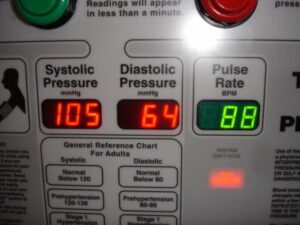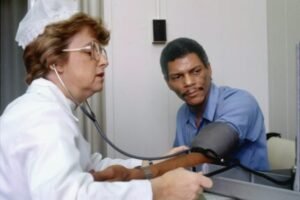Medically reviewed by Dr. Ramesh Gaddam, M.D. — Written by Sumalatha, D.N.H.E
Hypertension, commonly known as high blood pressure, is a condition where the force of blood against the walls of your arteries is consistently too high. Over time, this extra pressure can damage your blood vessels and lead to serious health problems.
Blood pressure is measured in millimeters of mercury (mmHg) and is given as two numbers:
- Systolic Pressure: This is the higher number and measures the pressure in your arteries when your heart beats.
- Diastolic Pressure: This is the lower number and measures the pressure in your arteries when your heart rests between beats.
A normal blood pressure reading is usually around 120/80 mmHg. If your blood pressure is consistently higher than this, it might be classified as hypertension.
1. How Blood Pressure Is Measured and Categorized?
Blood pressure is measured using a device called a sphygmomanometer, which includes a cuff that wraps around your upper arm.
The cuff is inflated to squeeze your arm, and then it slowly deflates.
During this process, a stethoscope or electronic sensor listens to the blood flow to determine your blood pressure.
Here’s how blood pressure categories are generally categorized:
- Normal: Less than 120/80 mmHg
- Elevated: Systolic between 120-129 mmHg and diastolic less than 80 mmHg
- High Blood Pressure (Hypertension) Stage 1: Systolic between 130-139 mmHg or diastolic between 80-89 mmHg
- High Blood Pressure (Hypertension) Stage 2: Systolic 140 mmHg or higher or diastolic 90 mmHg or higher
- Hypertensive Crisis: Systolic over 180 mmHg and/or diastolic over 120 mmHg, requiring immediate medical attention
Understanding these categories can help you recognize if your blood pressure is in a healthy range or if you may need to take action to manage it.
Regular check-ups with your healthcare provider are important for monitoring and managing your blood pressure effectively.
2. Causes of High Blood Pressure
There are two causes of High Blood Pressure:
- Primary Hypertension
- Secondary Hypertension
Primary Hypertension
Primary hypertension, also known as essential hypertension, is the most common type of high blood pressure.
It doesn’t have a specific cause but develops gradually over many years. Several factors can contribute to its development:
- Genetics: Family history can play a role. If your parents or close relatives have high blood pressure, you might be more likely to develop it.
- Age: Blood pressure tends to rise as you get older.
- Lifestyle Factors: Poor diet, lack of exercise, excessive alcohol consumption, and smoking can increase your risk.
Secondary Hypertension
Secondary hypertension is high blood pressure that is caused by another medical condition or use of certain medications.
It can develop suddenly and often leads to higher blood pressure than primary hypertension. Common causes include:
- Kidney Disease: Conditions affecting the kidneys can impact blood pressure regulation.
- Hormonal Disorders: Problems with hormones, such as those from the adrenal glands or thyroid, can raise blood pressure.
- Medications: Some medications, such as birth control pills, decongestants, and certain pain relievers, can contribute to high blood pressure.
Identifying the cause of secondary hypertension is crucial for effective treatment. Managing the underlying condition or adjusting medications can help control blood pressure more effectively.
3. Symptoms of High Blood Pressure
High blood pressure often doesn’t cause noticeable symptoms, which is why it’s sometimes called a “silent killer.”
Many people with high blood pressure may not feel anything at all. However, when symptoms do occur, they might include:
- Headaches: Particularly severe headaches can be a sign of high blood pressure.
- Dizziness: Feeling lightheaded or dizzy can sometimes be linked to elevated blood pressure.
- Blurred Vision: High blood pressure can affect your eyes and vision, causing blurry or impaired sight.
- Shortness of Breath: Difficulty breathing or feeling short of breath may be associated with high blood pressure.
- Nosebleeds: Frequent or severe nosebleeds can occasionally be related to high blood pressure.
4. When to Seek Medical Help?
Since high blood pressure often doesn’t show clear symptoms, it’s important to have regular check-ups to keep track of your blood pressure. However, if you have any of the following symptoms, you should seek medical help right away:
- Headaches: Severe headaches
- Chest Pain: Pain or tightness in your chest
- Breathing Problems: Difficulty breathing
These could be signs that your blood pressure is too high.
If you suddenly feel confused, have severe chest pain, or have trouble speaking, call emergency services immediately. These symptoms might mean you’re having a serious problem that needs urgent attention.
5. Diagnosing High Blood Pressure
When you go for a blood pressure check, a healthcare provider will use a tool called a sphygmomanometer. Here’s what you can expect during the process:
For a blood pressure check, you’ll start by sitting comfortably with your arm supported at heart level. It’s important to stay relaxed and avoid talking during the measurement.
A cuff will be placed around your upper arm and inflated to temporarily stop blood flow. As the cuff slowly deflates, the healthcare provider will listen to your blood flow with a stethoscope or use an electronic sensor.
Your blood pressure will be recorded as two numbers. The higher number, called systolic pressure, measures the pressure when your heart beats. The lower number, called diastolic pressure, measures the pressure when your heart rests between beats.
6. Risk Factors for High Blood Pressure

Some factors that can increase your risk of developing high blood pressure are beyond your control, while others can be managed with lifestyle changes:
- Genetics: Family history can increase your risk of hypertension.
- Age: Blood pressure rises with age. Regular checks are important.
- Diet: Too much salt and processed food raise blood pressure.
- Physical Activity: Lack of exercise can lead to higher blood pressure.
- Alcohol Consumption: Excessive drinking can increase blood pressure.
- Smoking: Smoking harms blood vessels and raises blood pressure.
- Diabetes: High blood sugar can damage blood vessels and increase risk.
- Kidney Disease: Kidney issues can disrupt blood pressure regulation.
- Sleep Apnea: Breathing problems during sleep can raise blood pressure.
- Hormonal Disorders: Thyroid or adrenal issues can affect blood pressure.
Understanding these risk factors can help you take steps to manage your blood pressure and reduce your overall risk. Regular check-ups and healthy lifestyle choices are key to keeping your blood pressure in a healthy range.
Additional Risk Factors
In addition to the well-known risk factors for high blood pressure, several other factors can also contribute to the condition:
- Sleep Apnea: This condition causes repeated breathing stops during sleep, which puts extra stress on the heart and can raise blood pressure.
- Chronic Stress: Long-term stress can keep blood pressure high due to continuous hormone release that affects heart rate and blood vessels.
- Low Vitamin D Levels: Some studies suggest that low vitamin D might be linked to higher blood pressure, though more research is needed to confirm this.
- Thyroid Disorders: Problems with the thyroid gland, such as an overactive thyroid (hyperthyroidism) or an underactive thyroid (hypothyroidism), can affect blood pressure. Hyperthyroidism can raise blood pressure, while hypothyroidism can weaken the heart and lead to high blood pressure.
- Certain Medications: Some drugs, like non-steroidal anti-inflammatory drugs (NSAIDs) and decongestants, can increase blood pressure by causing fluid retention and constricting blood vessels.
- High Cholesterol: Elevated cholesterol levels can lead to narrowed arteries, which can increase blood pressure.
- Sedentary Lifestyle: Not getting enough exercise can contribute to higher blood pressure. Regular physical activity helps maintain a healthy weight and supports heart health.
Addressing these factors through lifestyle changes and medical care can be important for preventing and managing high blood pressure.
7. Complications of Untreated Hypertension
If high blood pressure is not managed, it can lead to severe complications:
- Heart Attack: Increased risk of a heart attack due to heart strain.
- Heart Failure: Can cause the heart to weaken and fail.
- Kidney Failure: Severe damage to kidneys can result in kidney failure.
- Peripheral Artery Disease: Reduced blood flow to limbs can cause pain and mobility issues.
- Cognitive Impairment: Potential for problems with memory and cognitive function.
Managing high blood pressure is crucial to avoid these serious complications. Regular monitoring and proper treatment can help protect your health.
8. Treatment Options for High Blood Pressure

Lifestyle Changes
Medications
Alternative Therapies
Combining lifestyle changes, medications, and possibly alternative therapies can effectively manage high blood pressure. Regular medical check-ups and adhering to your treatment plan are essential for maintaining a healthy blood pressure level.
9. Preventing High Blood Pressure
Medically reviewed by Dr. Ramesh Gaddam, M.D.

General Physician, Diabetologist, and Critical Care Specialist.
Discover more from Health Build-Up
Subscribe to get the latest posts sent to your email.







Pingback: Baking Soda Substitute: Uses, Side Effects(6 Great Benefits)
Pingback: Daily Water Intake: 10 Tips for Hydration (Easy 8×8 Rule)
Pingback: Cardiovascular Diseases: Causes, Signs & (9 Prevention Tips)
Pingback: Childhood Obesity: Causes, Prevention (10 Amazing Tips)
Pingback: Diabetes: Types, Symptoms, Causes (12 Prevention Tips)
Pingback: Angina: Symptoms, Causes, Types, Risk Factors, Diet, Avoid
Pingback: Dizziness: Causes, Symptoms, Treatment & (12 Natural Tips)
Pingback: Preeclampsia: Symptoms, Causes, Treatment & Prevention
Pingback: Post-Exercise Hypotension: Causes, Symptoms & Prevention